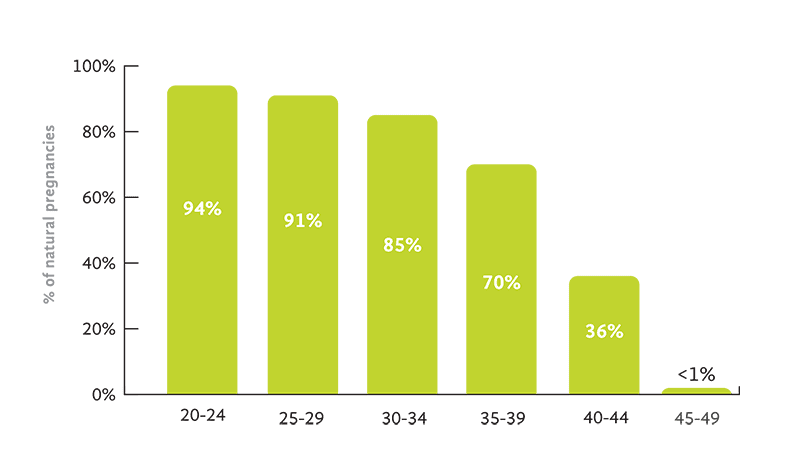Most women know that fertility declines with age, but many don’t realize how much. Quality and quantity of eggs are two key factors to consider in the egg freezing process. These are the primary reasons why you may consider freezing your eggs.
Age & Female Fertility
By age 35, about 30% of women will experience difficulty conceiving naturally due to declining egg quality. By age 40, about 65% of women will not be able to conceive naturally. Fertility treatments may help some of these women conceive using their own eggs, but others will not be successful and need to use donor eggs. Due to egg quality issues, even advanced fertility treatments such as IVF have limited success as maternal age advances.

Egg Quality:
The single most important predictor of egg quality is chronologic age. The quality of eggs starts to decline at age 30 as the probability of having an abnormal chromosome number increases. Eggs considered chromosomally abnormal increase the risk of infertility and miscarriage.

The number of eggs you have is set from birth, and begins to decline after you have your first period. You can estimate how many eggs you have with ovarian reserve testing methods, such as ultrasound or blood tests. However, overall egg quantity is highly variable at any given age and can range from anywhere between 10 and 20 for a normal healthy woman in her 30s.
Even if many of your eggs are reduced in quality due to advanced age, freezing a large quantity of eggs can help compensate for this. Additionally, for younger women with lower egg quantity, the presumed better quality of the eggs can increase their chances of future success.
Predicted success rate of live births from frozen eggs:
Why freeze with SRM?
EXPERIENCE MATTERS MOST
Experience is critically important when it comes to egg freezing—and we’ve frozen more eggs than anyone on the west coast. It’s important to note that egg freezing is a two-part process—(1) the freezing and (2) the thawing/fertilizing. And you won’t know how well your eggs will survive to make a baby until the time comes—potentially even several years from now. By choosing to freeze with some of the most highly trained embryologists available here at SRM, you’ll be setting yourself up for success down the road.
Hear from women who have gone through the egg freezing process at SRM and their experiences.
We have frozen over 30,000 eggs, thawed over 13,000 eggs, and enabled over 1,000 babies to be born from frozen eggs.




